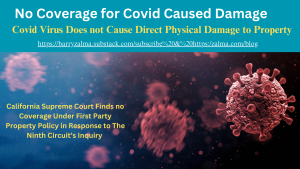No Coverage for Covid Caused Damage

Post 4816
See the full video at https://rumble.com/v4zjltl-no-coverage-for-covid-caused-damage.html and at https://youtu.be/RnfCBhHSiRc
California Supreme Court Finds no Coverage Under First Party Property Policy for Covid-19 Claims
The Ninth Circuit’s Inquiry
In Another Planet Entertainment, LLC v. Vigilant Insurance Company, S277893, the Supreme Court of California (May 23, 2024) where Chief Justice Guerrero authored the opinion of the Court, in which Justices Corrigan, Liu, Kruger, Groban, Jenkins, and Evans concurred in a response to an inquiry from the Ninth Circuit Court of Appeals that posed the following question: “Can the actual or potential presence of the COVID-19 virus on an insured’s premises constitute ‘direct physical loss or damage to property’ for purposes of coverage under a commercial property insurance policy?”
The question arose in the context of a civil lawsuit filed by Another Planet Entertainment, LLC (Another Planet) against its property insurer, Vigilant Insurance Company (Vigilant). Another Planet operates venues for live entertainment. It suffered pandemic-related business losses when its venues closed, and Vigilant denied Another Planet’s subsequent claim for insurance coverage.
The Supreme Court concluded, consistent with the vast majority of courts nationwide, that allegations of the actual or potential presence of COVID-19 on an insured’s premises do not, without more, establish direct physical loss or damage to property within the meaning of a commercial property insurance policy. Under California law, direct physical loss or damage to property requires a distinct, demonstrable, physical alteration to property. The physical alteration need not be visible to the naked eye, nor must it be structural, but it must result in some injury to or impairment of the property as property.
DISCUSSION
The Supreme Court noted that the fundamental principle of a property insurance contract is to indemnify the owner against loss; that is to place the owner in the same position in which he or she would have been had no accident occurred. However, as almost all first party property insurance provides, for there to be a need to indemnify the insured there must be direct physical loss or damage to the property, the risk of loss of which was insured.
Principles of Interpretation
The Ninth Circuit’s question and the parties’ arguments required the Supreme Court to interpret the phrase “direct physical loss or damage to property” in the insurance policy Vigilant issued to Another Planet. The clear and explicit meaning of these provisions, must be interpreted in their ordinary and popular sense, unless used by the parties in a technical sense or a special meaning is given to them by usage, controls judicial interpretation. If the meaning a layperson would ascribe to contract language is not ambiguous, the Supreme Court will apply that meaning.
Direct Physical Damage to Property
Notwithstanding the parties’ disagreement regarding the ultimate question of insurance coverage the available authorities in California and elsewhere reflect a substantial degree of consensus regarding the meaning of direct physical damage to property.
Direct Physical Loss to Property
Although the precise meaning of direct physical loss to property is more contested, its general scope is readily ascertainable. Loss can simply be a more extreme form of damage, but its meaning is also broader. Loss is often used to refer to destruction and ruin but its definition also includes the partial or complete deterioration or absence of a physical capability or function, an instance of losing someone or something, and the harm or privation resulting from losing or being separated from someone or something.
“Property Damage” in Commercial General Liability Policies
The nature of third party CGL insurance is materially different from first party property insurance. Third party coverage turns on the insured’s legal liability, rather than the fact of injury to property itself. Because the definition of property damage in Another Planet’s CGL policy is materially different, on its face, from the terms used in its property insurance policy, the former carries little weight in interpreting the latter.
CONCLUSION
The Supreme Court, after dozens of pages of analysis, answered the Ninth Circuit’s question as follows: “No, the actual or potential presence of the COVID-19 virus on an insured’s premises generally does not constitute ‘direct physical loss or damage to property’ for purposes of coverage under a commercial property insurance policy.”
I know I claimed I was sick of Covid cases and would ignore them in this blog. However, this case from the California Supreme Court answering an inquiry from the Ninth Circuit, although lengthy and detailed, was a very simple decision establishing the Covid virus does not cause direct physical loss or damage to the property, the risk of loss of which was insured. Hopefully this will put the issue to rest.

(c) 2024 Barry Zalma & ClaimSchool, Inc.
Please tell your friends and colleagues about this blog and the videos and let them subscribe to the blog and the videos.
Subscribe to my substack at https://barryzalma.substack.com/subscribe
Go to X @bzalma; Go to Newsbreak.com https://www.newsbreak.com/@c/1653419?s=01; Go to Barry Zalma videos at Rumble.com at https://rumble.com/c/c-262921; Go to Barry Zalma on YouTube- https://www.youtube.com/channel/UCysiZklEtxZsSF9DfC0Expg.
Go to the Insurance Claims Library – https://lnkd.in/gwEYk
Like this:
Loading…







